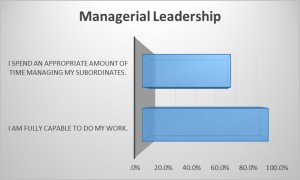
Empowerment is a tremendously powerful tool for a manger. It can extend your reach … you can’t and shouldn’t be looking over each team member’s shoulder every day. And it can dramatically improve the performance of your team because is enables each team member to use their full capability to make decisions and take initiatives that are consistent with you vision for your unit. In the most fundamental way, empowerment drives engagement, and we all know that employee engagement is highly correlated to high performance organizations.
Most employees are not empowered!
And yet organizations do an incredibly poor job at engaging their employees. Since the turn of the century when Gallup started measuring engagement, it has hovered at around 30% percent plus or minus of the work force. If everyone is empowered, how can it be that fewer than 1 in 3 employees is engaged?
So we end up with situations where employees who feel they are capable and want to get on with the job but don’t have the information they need from their manager to be able to focus in on the right things.
Effective ManagersTM research in this area gives us great insights. Managers rate themselves over 99% as being fully capable to do their work. And yet, just over 60% at being able to spend enough time with their subordinates. Further, managers report they spend just 55% of their time on value-added work.
This is a huge disconnect when one of a manager’s critical value-added accountabilities must be managerial leadership.
So what can you do to properly employee your team members?
Why do I suggest that the formula is a secret? Well it isn’t really a secret, in the same way as Coke-Cola has a secret formula. But is like a secret in the sense that no-one seems to be talking about these things. Think about it: Who teaches managers how to manage? Typically, managers learn to manage by watching their managers. And since most managers do not do their managerial leadership work, we have created a vicious circle.
At Effective ManagersTM we have thoroughly reviewed the best of the best of managerial systems and have distilled them to create the Five Requirements of Effective ManagersTM . These five requirements are a framework for all managers that want to be effective in their work. These are the must-do’s for managers, and if they are done well, will help you to create a high performance team.
Here is a very short summary of these five requirements:
- Plan: Develop a plan that is a subset of your manager’s plan, and that links all the way back to the organization’s strategic goals.
- Do: For those things that must be done to execute your plan, decide that work which only you, in your position, with your capability, can do, and decide when and how you will do it.
- Set Context and Boundaries: Provide context to your team as a whole and to each team member individually to guide their decision-making so they are consistent with your plan and the organization’s priorities.
- Delegate: Decide which work must be done by each team member so that in combination their work and yours will lead to the successful execution of your plan, and specifically delegate those things which each of them is specifically accountable for over and above their ongoing operational work.
- Create Feedback Loops: Create feedback loops between yourself and your team, yourself and each team member, managers in other parts of the organization, and relevant community members.
It Starts with the Manager
Yes, it does start with you. As a manager you need to be clear with yourself about the direction in which you are taking your department and how that fits into the organization’s strategy (your plan). And you need to be clear about your own value-added work – that which you alone can do for success. Then you can be clear with your team members about what they need to accomplish, fully involving them in the process.
Watch the recorded Webinar: The Secret Formula for Successful Empowerment
Employees should be empowered to make decisions. But all too often, managers misinterpret what empowering your employees means. And the result is managerial abdication. The empowerment of team members is actually pretty hard work. The results, though can be amazing.
In this Webinar we describe how empowerment is misused in organizations. We will then describe the managerial leadership work that need to be in place for successful empowerment. Finally, we will give you some insights into how you can work differently, so your team can be more productive.





